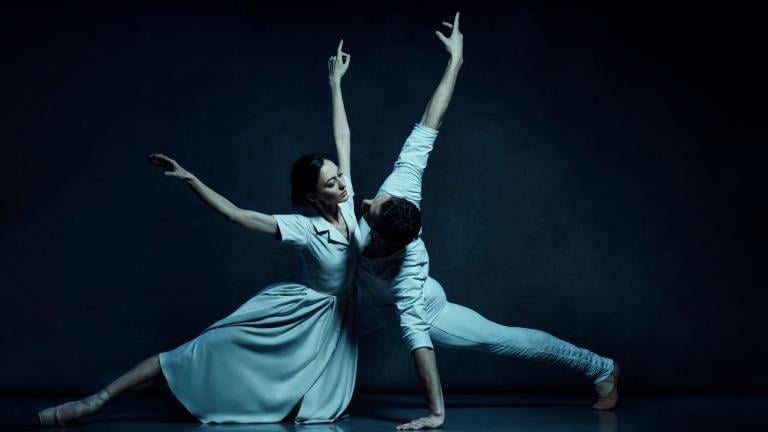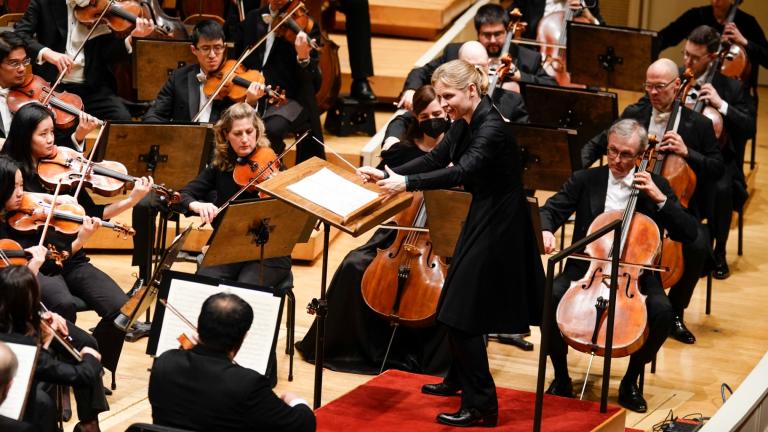 Guest conductor Jaap van Zweden leads the Chicago Symphony Orchestra in Mahler’s “Symphony No. 6 in A Minor” on April 21, 2022. (Credit: Todd Rosenberg)
Guest conductor Jaap van Zweden leads the Chicago Symphony Orchestra in Mahler’s “Symphony No. 6 in A Minor” on April 21, 2022. (Credit: Todd Rosenberg)
Breathtaking is nowhere near a powerful enough adjective to describe Gustav Mahler’s masterwork, “Symphony No. 6 in A Minor,” or its bravura rendering by the Chicago Symphony Orchestra that was led by guest conductor Jaap van Zweden on Sunday afternoon in the last of its four performances at Orchestra Hall.
The grandeur and passion of this sublime 80-minute work of genius — with its powerful mood shifts yet surprisingly seamless emotional cohesion, and its remarkable use of every section of a massive orchestra comprised of brilliant musicians — fused in an unforgettable way. And while Mahler did not live long enough to know that this symphony would be fully recognized, this concert served as a magnificent homage to the composer.
In his program notes for the CSO, Phillip Huscher described how Mahler and his family spent the summer of 1903 in a villa, and how he retreated to a tiny hut in the adjoining forest to compose the work. (You can find photos of it on online.) And listening to the symphony, you cannot help but wonder how all the “sturm und drang” and overwhelming beauty and emotional complexity of the work could have emerged from the composer’s imagination in that shack. Perhaps that was the secret.
The symphony opens to the sound of powerful drum beats. A ferocious storm is brewing — the dire warning of a war that might be military in nature but also a form of combat between the heart and soul. The horns blare, the percussion sounds, the massive orchestra is on alert. Yet a rapturous beauty is never far behind, with a sense of lush, sweepingly romantic sound countering the attack of timpani, cymbals and brass. Such great musical color!
And then a certain quietude set in, with the lightness of the celeste, the gentle heat of the winds, the triumphal sound of the French horns and a thrilling, high-speed massing of the full orchestra. And that was just the first of the symphony’s four movements.
The second movement begins with a blast of the timpani and full orchestra and a feverish anticipation of what is to come. But as it turns out, it is something of a lovely formal dance, followed by the horns and an almost teasing riff from the winds, the sounding of French horns, and a playful blend of percussion, plucked strings, xylophone and harps — an overall fabulous layering of instruments demonstrating Mahler’s ingenious use of multiple voices.
The symphony’s third movement opens in a very different way, with a beautifully lyrical, dreamy melody, a French horn solo, the return of the winds and strings. A lushly romantic turn. But Mahler never lets you rest; there is always an undertow to his music.
And the fourth and final movement of this monumental work begins with a big blast of percussion and the sound of the brass, along with a strong suggestion that something is brewing at a distance. And indeed it is, with an intensely stormy, triumphant and wholly rapturous force building to the fabled two massive blows of a hammer wielded by the sylphlike Cynthia Yeh. And from there it is a chase to the finish with a haunting quiet followed by yet another huge blast of sound in this work that is a dazzling mix of monumentality and intimacy.
Throughout, van Zweden brought a clarity, elegance and ideally restrained dynamism to this thunderous yet ravishingly beautiful work. And I can’t imagine any conductor not wanting to lead an orchestra as phenomenal as the CSO whose scores of brilliant musicians possess a near magical ability to fuse as one.
Note: Coming up for the CSO (April 28, 29, 30 and May 3) is the return of Maestro Muti and a program featuring a world premiere by Jessie Montgomery, the CSO’s dynamic Mead Composer-in-Residence, along with Beethoven’s “Symphony No. 6 (Pastoral),” and Bottesini’s “Double Bass Concerto No. 2,” featuring the orchestra’s principal bass, Alexander Hanna.
For tickets visit cso.org or phone 312-294-3000.
Follow Hedy Weiss on Twitter: @HedyWeissCritic








